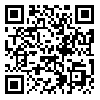Volume 5, Issue 3 (12-2023)
Tabari Biomed Stu Res J 2023, 5(3): 33-39 |
Back to browse issues page
Download citation:
BibTeX | RIS | EndNote | Medlars | ProCite | Reference Manager | RefWorks
Send citation to:



BibTeX | RIS | EndNote | Medlars | ProCite | Reference Manager | RefWorks
Send citation to:
Azarmehr T, Pouladkhay F, Nasiri Formi E, Abjar R, Sargolzaei F. Examining the Knowledge, Attitude, and Performance of Operating Room Personnel about the Use of Personal Communication Devices. Tabari Biomed Stu Res J 2023; 5 (3) :33-39
URL: http://tbsrj.mazums.ac.ir/article-1-3813-en.html
URL: http://tbsrj.mazums.ac.ir/article-1-3813-en.html
Tayebeh Azarmehr *1 

 , Fatemeh Pouladkhay2
, Fatemeh Pouladkhay2 

 , Ebrahim Nasiri Formi3
, Ebrahim Nasiri Formi3 

 , Rana Abjar4
, Rana Abjar4 

 , Fereshte Sargolzaei5
, Fereshte Sargolzaei5 




 , Fatemeh Pouladkhay2
, Fatemeh Pouladkhay2 

 , Ebrahim Nasiri Formi3
, Ebrahim Nasiri Formi3 

 , Rana Abjar4
, Rana Abjar4 

 , Fereshte Sargolzaei5
, Fereshte Sargolzaei5 


1- Department of Operating Room, School of Allied Medical Sciences, Zabol University of Medical Sciences, Zabol, Iran
2- Department of Operating Room, School of Allied Medical Sciences, Gonabad University of Medical Sciences, Gonabad, Iran
3- Department of Anesthesiology, Operating Room and Emergencies, School of Allied Medical Sciences, Traditional and Complementary Medicine Research Center, Addiction Institute, Mazandaran University of Medical Sciences, Sari, Iran
4- Department of Operating Room, School of Allied Medical Sciences, Alborz University of Medical Sciences, Karaj, Iran
5- Department of Operating Room, School of Nursing and Midwifery, Zahedan University of Medical Sciences, Zahedan, Iran
2- Department of Operating Room, School of Allied Medical Sciences, Gonabad University of Medical Sciences, Gonabad, Iran
3- Department of Anesthesiology, Operating Room and Emergencies, School of Allied Medical Sciences, Traditional and Complementary Medicine Research Center, Addiction Institute, Mazandaran University of Medical Sciences, Sari, Iran
4- Department of Operating Room, School of Allied Medical Sciences, Alborz University of Medical Sciences, Karaj, Iran
5- Department of Operating Room, School of Nursing and Midwifery, Zahedan University of Medical Sciences, Zahedan, Iran
Abstract:
Introduction: There is a growing concern about the impact of personal electronic devices (PEDs), including mobile phones, on healthcare, particularly in the operating room, as they can lead to distractions and reduced focus, compromising patient safety.
Material and Methods: This cross-sectional descriptive study involved 127 healthcare personnel and anesthesiologists working in teaching hospitals affiliated with Mazandaran University of Medical Sciences. The study aimed to investigate their awareness, attitude, and performance regarding the use of PEDs. Questionnaires were administered, and data analysis was carried out using statistical tests.
Results: All participants used mobile phones as their personal communication devices in the operating room. Most participants used their devices for various purposes, such as making calls, sending messages, and emails, playing games, and internet browsing. The mean attitude score was 65.34 ± 38.9, the mean performance score was 33.30 ± 32.4, and the mean awareness score was 88.5 ± 77.29. Factors like age, gender, field of study, educational level, and work experience did not significantly affect attitude, performance, or awareness scores.
Conclusion: It is essential for healthcare professionals to strike a balance between using personal electronic devices to enhance patient care and managing potential distractions. These findings can inform strategies to prevent distractions caused by mobile phone use and ensure patient safety in healthcare settings. Further research is needed in this area to provide effective solutions and mitigate risks associated with PED use in healthcare.
Material and Methods: This cross-sectional descriptive study involved 127 healthcare personnel and anesthesiologists working in teaching hospitals affiliated with Mazandaran University of Medical Sciences. The study aimed to investigate their awareness, attitude, and performance regarding the use of PEDs. Questionnaires were administered, and data analysis was carried out using statistical tests.
Results: All participants used mobile phones as their personal communication devices in the operating room. Most participants used their devices for various purposes, such as making calls, sending messages, and emails, playing games, and internet browsing. The mean attitude score was 65.34 ± 38.9, the mean performance score was 33.30 ± 32.4, and the mean awareness score was 88.5 ± 77.29. Factors like age, gender, field of study, educational level, and work experience did not significantly affect attitude, performance, or awareness scores.
Conclusion: It is essential for healthcare professionals to strike a balance between using personal electronic devices to enhance patient care and managing potential distractions. These findings can inform strategies to prevent distractions caused by mobile phone use and ensure patient safety in healthcare settings. Further research is needed in this area to provide effective solutions and mitigate risks associated with PED use in healthcare.
Send email to the article author
| Rights and permissions | |
 |
This work is licensed under a Creative Commons Attribution-NonCommercial 4.0 International License. |




